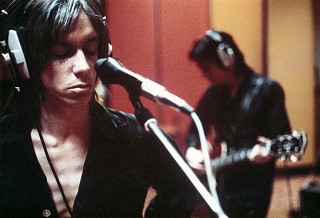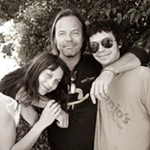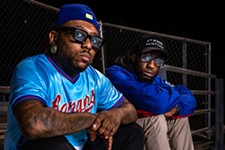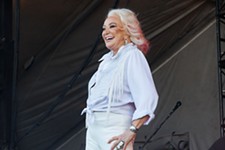Shake Appeal
James Williamson: Stooge to Suit to Stooge
By Raoul Hernandez, Fri., May 28, 2010

"Hey, you wanna get your little fuckin' face punched out, little cracker boy? Come up here!" shouts Iggy Pop. "Come up here little 'billy boy, I'm sick of your shit!"
One assumes the amplified thud next is the Stooges frontman throwing the mic down in full taunt. So peaks the "Georgia Peaches" live disc from last month's deluxe reissue of Raw Power, the Detroit punk pioneers' third and final corrosion until 2007 reunion platter The Weirdness. Occurring at the end of the electrifyingly profane "Head On," complete with Ron Asheton's Band of Gypsys bass solo, Iggy's outburst comes off somehow less shocking than not only the song's Deliverance-like violation but also its power-pole-in-a-pool surge. "I don't think he likes us," remarks a woman in the audience after its eight-minute defoliation. "Suck my ass, blue boy," spits Iggy finally before the band begins arming "Gimme Danger."
Raw Power's new four-disc treasure chest on Sony Legacy – the original 1973 LP, Atlanta's live reactor melt from the same year, plus an outtakes CD and DVD documentary – leaves no room for shuck-'n'-jive. From the 34-minute original release's opening torpedo, "Search and Destroy," and surfing guitar thrust of "Your Pretty Face Is Going to Hell" to the undertow dance party of the title track, the tar-pit blues of "I Need Somebody," and hand-clap seismography of "Shake Appeal," Raw Power earns its title. Punch your face out R&B.
Stooges guitarist James Williamson began life due west of San Antonio, in Castroville, whose chamber of commerce brands the burg "The Little Alsace of Texas" thanks to its founding in 1844 by colonists from the Alsace region of France. That's approximately a half-century removed from Northern California's Silicon Valley, where Williamson currently resides. Volcanic ash delayed our interview earlier this month.
Austin Chronicle: So, Icelandic volcanoes ....
James Williamson: Go figure, you know – the best-made plans. We had everything all set up, and actually I think the first we got wind of it was when we were supposed to take a plane between Strasbourg and Lille and nothing doing. So we had to drive all night to Paris and then we just sat, you know, sat in Paris for four, five days waiting to get out like everybody else, though there are worse places to kill time.
AC: The Stooges were in Europe to perform?
JW: Yeah, we had our first four dates over there a couple of weeks ago, and that went really well, the only hitch being getting stuck there. There's a private screening of the DVD that goes with the deluxe re-release of Raw Power, so I'll go down to Hollywood for that, then I leave for Madrid the next day.
AC: That DVD has a clip of the Stooges hyperventilating Brazil last November. Was that your first gig back with the band?
JW: Yes. That was our first time back together live, and you know, it was quite a whiplash for me, because I had never played for a crowd that size before. I think there was about 30,000 people. We went down there and didn't know if we were ready or not, but it turns out we were.
AC: So was your first show back in fact like riding a bicycle or was it more surreal than that?
JW: You know, it had elements of both. The bike-riding part was more about the time leading up to that, because I agreed to do this back in May to June, and I started seriously woodshedding back then. It took a bit of doing, but I was lucky because it's my music, my style, so for the most part it was quite straightforward, though I still had to get the chops together.
AC: Now I'm told you're originally from Castroville.
JW: That's true. Yeah, absolutely. My father was the one-horse-town doctor and owned the clinic there. He delivered me himself. He passed away, and I moved with my mom to San Antonio when I was about 4 or 5. Yeah, I've spent a lot of time in Texas including Austin. I worked for Advanced Micro Devices, which is down there in Austin and here as well, so I've been to Austin a million times. I worked for AMD from 1982 until, gosh, it must have been the mid-Nineties. I've done my time on Sixth Street and everywhere else there. It's a great town.
AC: Do you feel Texan, or is that an abstract concept?
JW: I don't think you can avoid it. If you're from Texas, you know it, and if you don't know it, somebody is going to remind you. I have a lot of family down there still. My sister moved down outside of Dallas, and I have cousins and aunts and uncles and stuff. So I can relate to Texas. You know there are some parts I relate to better than others, Austin being one of them.
AC: How does a kid from Castroville end up in Birmingham, Michigan?
JW: My mother was a nurse, and after my father passed away and we moved to San Antonio, she went to work for USAA, which is an insurance company in San Antonio. She was the company nurse, and they're a big insurer of the military, so she met my stepfather there. They got married in San Antonio, but since he was in the military, we moved with him to different places, like Oklahoma, and then eventually to Michigan. That was his last assignment.
AC: That's got to be some culture shock.
JW: Oh yeah. I went there in the summer between seventh and eighth grade, and I didn't know what to make of it. I was actually kind of lucky, because at that time in life you don't really know what you want to do. I was playing a little tennis, but I didn't have a lot of things to keep me occupied. I happened to move next door to a guy who played guitar, and he was good. He was just a little older than me. I had a guitar at that point, but I really couldn't play it. I hardly knew any good chords. But he did, so I spent that summer learning how to play guitar. That's where it all started.
AC: Who were your early influences on guitar?
JW: In terms of that era there were all the usual suspects. I started out with folk music, because this guy next door, his whole family was into folk music. His brother was in college, so there was the whole Kingston Trio thing, and his sister sang, so I started there and then I got into Bob Dylan, who was a big influence on me. And then, of course, the Beatles broke in the U.S., followed by the Stones, who I was actually more attracted to. There was that whole string of bands, the Yardbirds, the Kinks.
By that time I started being in bands myself, so I got a lot of influences from the local music scene there, which was huge. Detroit was just on fire with music, starting with Motown and then all the local bands, the Rationals and Bob Seger. All those guys were all playing all the time. So other than that, I think that if you have to boil it down to one or two really big influences, I'd say maybe Keith Richards for his attitude and Jeff Beck for his guitar playing. I'm still a huge Jeff Beck fan, but I realized early on that I couldn't play like either of them, so it was easier for me to just make up my own stuff.
AC: In some pictures from the DVD you have an insolent Keith Richards look to you.
JW: Yeah, yeah I did. But I wasn't really like him. It was just – I kind of looked a little bit like him. Anyway, I developed my own style; people ask me all the time, "How did you get that sound?" And it's just that I wrote my own music and I felt like I should play a lot of chords. I don't know why, but I did. In order to do that I had to figure out a way to pick the guitar so that I could play all those chords fast. That's how I developed this down-picking style, which is almost exclusively what I do. That has a certain sound to it, and that's something a lot of guys miss when they try to imitate me. They're not looking at the right hand; they're looking at the left hand.
AC: In the Raw Power documentary Iggy calls your style a precursor to speed metal.
JW: You know, I think it was a precursor to a lot of things, but certainly metal guys have picked up on it, and I know they're big fans of the band. The first time I heard the term "metal" I think it came from Lester Bangs in 1973 or 1974. Everybody was always looking for labels and stuff, but we didn't have that kind of frame of reference.
AC: In the doc, Scott Asheton attributes the group's break-up in 1974 in part to substance abuse. Were you Keith Richards-esque in your personal life?
JW: I was no angel, but I wasn't a heavy drug user. And you know it wasn't the drugs. I mean they didn't help anything, but I think the band broke up because we just became demoralized. It's really hard to describe to people when you're literally living hand to mouth, you know, on a death march around the country trying to play gigs just so you can survive, and really, very few people liked us. I mean we were a spectacle, but not something that people would really pay to see that much. We had a core group of fans, but not really, and we didn't help them much. As entertainers we left a lot to be desired, because we would get bored with our stuff quickly and always be writing new material so that when you came to one of our shows, you probably had only heard a few of the songs. We would always do new stuff.
AC: Ron Asheton died last year. Had you spoken to him?
JW: Yes, a few times. My sister, before she moved to Texas, was still living up in that area, by Ann Arbor, so when I'd go visit her I'd always make a point of stopping in and seeing Ronnie or Kathy, his sister, or Scotty if he was around.
AC: Everyone says it would have meant a lot to Ron to have finally gotten into the Rock and Roll Hall of Fame.
JW: I'm sure it would have, yeah. Ronnie had the rock dream, you know. He was a guy that led a very internal life and really had a different reality than other people, and so his whole life, from the time I first met him, which was when he started playing bass for my first band the Chosen Few, he was always that way. I wasn't in the band anymore when I first saw him, but I went to their gig and he was playing to his amplifier. He had his back turned to the audience – that's just the kind of guy he was. So yeah, there's no doubt getting in would have been very meaningful to him.
AC: Help me understand how it takes eight ballots to get the Stooges into the Rock and Roll Hall of Fame. The nominating committee is made up of people like Dave Marsh and Jon Landau, who know what's what.
JW: Well, I think it's a combination of things. Initially, you had some very powerful people who did not like the Stooges, and there's a lot of good reasons for that. Back in the day we weren't very reliable and didn't sell a lot of records, so a lot of people put their thumbprint on us as being a success and we let them down. I think the reason in subsequent years was that the Rock and Roll Hall of Fame system is such that, yes, the nominating committee is made up of those people you referred to and seven times those guys put our name forward. But then it has to go to the electorate, which is about 500 people to vote you in. When you look at the dance card each year even I had to say, "Wow those guys were good; I'd vote for them." So it was a real tough thing, but lucky for us they let us in this year.
AC: You were at the induction ceremony.
JW: Oh, absolutely.
AC: Was that cool or cheesy or what?
JW: Well, it was both. Actually, honestly speaking, I have to say that night was one of the best nights of my own personal family's time together. I mean, it was just amazing that they could all come with me. This year was different because it was an anniversary year, so they held it at the Waldorf-Astoria [in New York] and it was a very, very limited audience and really, really expensive for people buying seats. It was black-tie, and you had Meryl Streep there and the Boss and all these people, Michael Douglas – you name it – but the cool thing was that the band was ready to do it. We had a bunch of people getting awards this year, like Jimmy Cliff, ABBA, Genesis, the Hollies, and so on, but most of those people weren't playing anymore. Jimmy Cliff sounded good, and we were tight. We sounded really good. We livened up the evening.
AC: The Raw Power remaster accentuates all the album's power points. David Bowie did the original mix, long a center of controversy in Stooges lore. What was your impression of him, musician to musician?
JW: I've gone on record so many times I guess it doesn't really matter anymore. I personally didn't like David Bowie that much. As a musician, however, you have to say he's done brilliant things. There's no doubt about it. He knows how to craft a song, and he knows his way around a studio, but in terms of Bowie mixing Raw Power, that's a whole other matter, because he had no idea what to do with the album. It was entirely out of his musical context, and honestly I think he just said, "Oh fuck it, I'll just do some stuff." And that's what he did.
AC: So much has been made about the Bowie mix of Raw Power, and yet for better or worse, the album doesn't sound quite like anything else. It's so raw and yet it has those rounded tones of classic 1960s discs.
JW: Well right, I agree. I think that the importance of the album and/or the mix is its historical importance in that's what people heard when they first played the album. Even though we didn't like it at the time, we have culpability because we were there. If we had something to say, we should have said it then. It was a compromise we had to make to get the album released because management wasn't having the version we sent them. I'm happy about the re-release because they did a really good job on the mastering. A lot of things come out in the mix now that weren't there when it was first released.
AC: What was your reaction to your guitar playing in listening to these mixes?
JW: Bowie's mix was big, so basically all you get is guitar. You can't miss what I was playing, but the other guys, you couldn't hear them too well.
AC: Ever run into Bowie in the intervening years?
JW: Oh yeah. After Raw Power, Iggy and I did an album called Kill City, which just got remixed by the way, and it sounds fantastic now. I have to say it's finally reached its full potential. Beyond that, I produced an album for Iggy called New Values, and then after that, he wanted me to produce another one that ended up being called Soldier. Bowie showed up for some of those sessions, and they didn't go well for a number of different reasons.
AC: I'm wondering how a song like "I Got a Right," which is on the new Raw Power outtakes CD, doesn't end up on a 34-minute LP.
JW: Well, it would have if it had been up to us. When we first went to London, we had a bunch of those songs like "I Got a Right" and "I'm Sick of You" and so forth. They were all stuff that we were doing in 1971 at the end of the Stooges' first breakup, so we started recording demos [for Raw Power], but management never really understood our music. Every time we would bring them a demo, it was rejected, so all those songs went by the wayside.
AC: The live disc Georgia Peaches, had you ever heard that?
JW: No I hadn't, but I remember those gigs so well. We had a pretty good run that week at Richards' in Atlanta, and, yeah, those people, lucky for us they were fun-loving people, because you can hear Iggy just egging those guys on. I tell you what, coming from Texas, you knew this was the kind of a place where there was tablecloths and you'd bring your date. So here we are. We hit the stage and Iggy just starts berating these guys' dates and saying stuff to them, "Come on up here, you cracker," and all this stuff. He's just lucky nobody took him up on it is all I can say. That's the string of gigs where Elton John showed up in the gorilla outfit. You know about that?
AC: No.
JW: Yeah, so Elton John is in town for whatever reason, and I think he was kind of a fan of the Stooges or else he wanted to get some action with somebody or whatever. Anyway, he showed up in a gorilla suit and came onstage while we were playing. Everybody's looking at this guy like, "Who the fuck is this?" and he was pretty close to getting in some real trouble onstage with us. You know, like getting hit with a guitar or something. Anyway, I think he sensed that and took his head off and showed us that he was Elton. That was the week that happened.
AC: How did you and Iggy hook up again? From the DVD it sounds like you called him after Ron Asheton died.
JW: No, the other way around. He called me up. As a matter of fact, I already had heard about it, because someone else had shot me an e-mail right when the news went out. Maybe a day after that Iggy called me up. I remember it vividly because I was sitting outside of my dentist's office when he called. We were just commiserating because it was a tough time and everybody was upset about it, shocked by it really. What we talked about mostly was the funeral arrangements and whether or not I would be coming or not, that kind of stuff.
It wasn't until later that he called me up again and had a problem on his hands, which was when you do tours you're booking them six months to a year in advance and so he had a bunch of dates they had committed to already and he didn't know how he was going to fill them. He asked me if I wanted to play guitar, and at that time I was still working for Sony, so I said, "No, I got a day job," and told him I'd do the Hall of Fame if we ever got in, but I can't go out on tour.
As fate would have it, though, Sony – not being immune to this economy – started handing out early retirement packages around March, and they were good packages, too. I hadn't thought about retiring because I'm just 60, but when they showed me the numbers I did the math, and it was pretty impossible to turn that down so I took it. That's when I thought: "I'll call Iggy back and tell him I'm available. I'm retired."
That's what I did, and he was delighted to hear it, but of course in the meantime he had canceled all those shows for that year. But we started making plans for the next year, and it was simply coincidental that Sony Music decided to reissue Raw Power. That dovetailed nicely.
AC: Most people retire out of rock & roll, not into it!
JW: Go figure, you know? I think Fortune magazine is going to run an article on that, "The Stooge to the Suit to the Stooge" [laughs]. The other thing that really astonishes me is that anybody cares. We're a bunch of old guys, and yet it's like we're 20-year-old rock stars. I mean our audiences are literally in their 20s.
AC: What's next? What's on the horizon?
JW: I think we're looking at this as a three-year horizon, and then we can take stock of where we're at. We've got some new material we're working on, and we'd like to issue some new stuff, but we only want to do it on our terms. We don't want to get locked in with a record company and have to release product whether we like it or not. We're working on how to handle things like that, but right now we're a little bit too busy to really deal with it. Maybe after September, when we take a little break.
AC: One gets the sense from watching the DVD that Iggy, who's obviously had ups and downs in his solo career, seemed happy to have people like you to work with, that you were family, and that it's better to be working with somebody instead of just helming the ship on his own.
JW: There's no doubt about it. I think we all feel that way. You know, this band is kind of bigger than the sum of its parts, so it's really important for all of us – maybe for some of the same reasons and then again, some different reasons – but nonetheless, I think everybody feels like it's a privilege to have this opportunity. We all take it very seriously.










